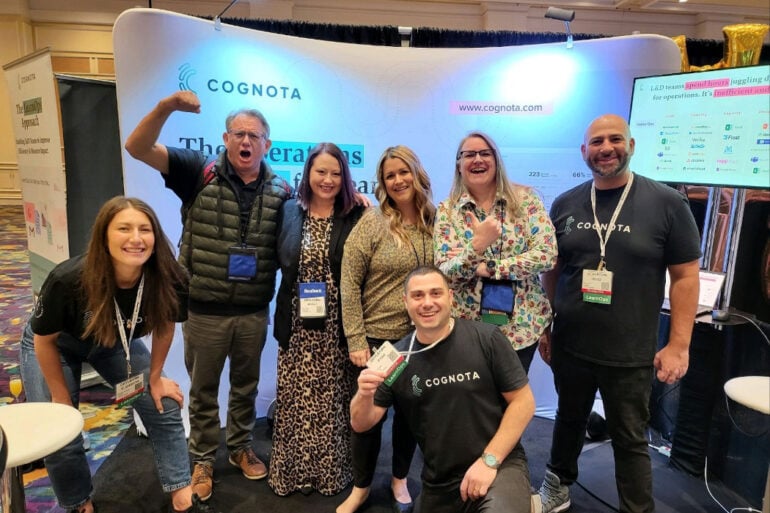In this interview, David Pere, the founder of From Military to Millionaire, shares his inspiring journey from the Marine Corps to financial freedomt ...
Ryan Austin on Revolutionizing Corporate Learning: The Cognota Journey
Written by: Esther Strauss
Esther is a business strategist with over 20 years of experience as an entrepreneur, executive, educator, and management advisor.
Published on November 14, 2023

In the dynamic landscape of technology and innovation, few entrepreneurs have made as significant an impact as Ryan Austin, the visionary CEO and founder of Cognota. Embarking on a journey that melds technological prowess with a deep understanding of corporate learning and development, Austin has carved a unique niche in a crowded market. This exclusive interview peels back the layers of Cognota’s inception, exploring the inspiration and tenacity behind one of the most intriguing startups in the tech world.

Through a series of thought-provoking questions, we delve into the heart of Cognota’s success story. From overcoming early-stage entrepreneurial hurdles to revolutionizing data-driven decision-making in businesses, Ryan Austin offers a rare glimpse into the mechanics of building a groundbreaking learning operations platform. His insights not only shed light on Cognota’s distinctive approach but also serve as a beacon for aspiring entrepreneurs navigating the tech industry’s ever-evolving challenges and opportunities.
Journey to Cognota
SBS – What inspired you to start Cognota, and what challenges did you face in the early stages of your entrepreneurial journey?
Ryan – I was inspired to start Cognota after realizing that the learning and development industry was lacking a dedicated operating system. L&D teams oversee a significant amount of spending, but they often rely on disparate tools and systems, which leads to inefficiencies and a lack of data-driven insights.
I wanted to create a solution that would streamline L&D workflows, from training requests to learning measurement, all in one platform. This would provide L&D teams with the data and insights they need to run their operations more effectively.
The early stages of my entrepreneurial journey were challenging. One of the main challenges was determining the right market fit for our product. We had to pivot and shift our focus to an end-to-end solution for enterprise customers. This required rebuilding our platform from the ground up, which took time and resources.
Another challenge was funding. Like many startups, we faced the challenge of securing enough capital to support the development and growth of our business. We had to pitch to investors, demonstrate the potential of our product, and convince them of the value we could bring to the market.
Overall, the early stages of building Cognota were a learning experience. We had to be adaptable and willing to pivot when needed, and we had to persevere through the challenges to bring our vision to life.

Vision and Innovation
SBS – How does Cognota’s learning operations platform revolutionize corporate learning and development, and what was the key innovation that set it apart from existing solutions?
Ryan – Cognota’s LearnOps platform revolutionizes corporate learning and development (L&D) by providing a dedicated operating system that streamlines L&D workflows and enables effective measurement of learning outcomes and business value.
The key innovation that sets Cognota apart from existing solutions is its focus on learning operations. While other vendors and technology providers mainly focus on content creation and delivery, Cognota moves upstream into the operations realm where other tools and systems are lacking. Cognota’s LearnOps platform enables L&D teams to efficiently manage training requests, design and deliver learning programs, assess learner progress, and measure the impact of learning on business outcomes.
By centralizing these functions into one platform, Cognota eliminates the need for L&D teams to rely on disparate tools, reducing complexity and improving productivity. The platform also provides data-driven insights and analytics, allowing L&D teams to make more informed decisions and demonstrate the value of learning initiatives to business stakeholders.
In addition, Cognota places a strong emphasis on community and partnerships. With the LearnOps Community on LearnOps.com, Cognota fosters collaboration, shared learning, and best practices among L&D professionals. The platform also offers community-supported accelerators, such as the LearnOps Academy, to support L&D teams in navigating change and driving departmental transformation.
Overall, Cognota’s LearnOps platform brings together the essential elements of corporate L&D into a single, purpose-built solution, empowering L&D teams to run their operations more efficiently and effectively while driving business impact.
Data-Informed Decisions
SBS – Can you elaborate on how Cognota enables leaders to make data-informed decisions? What impact has this had on business strategies?
Ryan – Cognota enables leaders to make data-informed decisions by providing them with comprehensive data and analytics on learning initiatives and outcomes. Through the LearnOps platform, leaders have access to real-time, actionable insights that can inform their business strategies and drive decision-making.
Here are the key ways Cognota enables data-informed decision-making:
- Data-driven learning measurement: Cognota’s platform captures detailed data throughout the learning process, from training requests to learner progress and outcomes. This data is used to generate reports and analytics that highlight the effectiveness and impact of learning initiatives. Leaders can gain insights into learner engagement, knowledge retention, skill development, and overall business performance. This information helps leaders make informed decisions about resource allocation, curriculum design, and learning program optimization.
- Increase learning return on investment (LROI): With Cognota, leaders can assess the business impact of learning experiences. By tracking key metrics and leveraging analytics, leaders can connect the dots between learning initiatives and tangible outcomes, such as improved performance, increased productivity, or cost savings. This LROI measurement helps leaders prioritize investments, allocate budgets more effectively, and drive strategic alignment between learning programs and business objectives.
- Agility and adaptability: Cognota enables leaders to quickly and accurately identify gaps in skills and knowledge across the organization. By analyzing learning data in real time, leaders can identify areas of strength and development needs and adjust learning strategies accordingly. When changes are needed, leaders can foster a culture of continuous learning, empowering agile responses to evolving business demands.
The impact of data-informed decision-making enabled by Cognota’s platform is multifaceted:
- It helps leaders identify high-potential talent and focus development efforts effectively
- It aligns learning strategies with broader business goals, ensuring investments are directed towards skills and competencies that have a direct impact
- It closes skill gaps more efficiently, promoting employee growth and career development
- It provides data-backed evidence of the value and impact of learning programs to key stakeholders, securing buy-in and support for future L&D initiatives
- It enables leaders to track ongoing performance and assessment metrics, paving the way for continuous improvement
By equipping leaders with data and insights, Cognota empowers them to make informed decisions that drive the alignment of L&D strategies with overall business strategies and objectives.
Entrepreneurial Challenges
SBS – As an entrepreneur, what were the most significant challenges you faced in developing and scaling Cognota, and how did you overcome them?
Ryan – As an entrepreneur, there have been several significant challenges in developing and scaling Cognota. Here are a few key challenges we have faced and how we have overcome them:
- Building the right product-market fit: Developing a solution that meets the needs of our target customers has been crucial for success. Early on, we had to pivot and shift our focus from content design to an end-to-end platform for enterprise customers. This required rebuilding our platform and adjusting our product roadmap based on market feedback. By actively listening to our customers, conducting user testing, and iteratively refining our product, we have been able to create a solution that aligns with the market’s needs.
- Scaling the technology infrastructure: Ensuring that our technology can scale to handle more users, large volumes of data, and complex learning operations has been a challenge. We have continuously invested in improving the scalability, reliability, and performance of our platform to ensure that it can accommodate growth and handle the needs of our enterprise customers. This has required strategic infrastructure planning, building scalable architectures, and allocating resources appropriately.
- Establishing and expanding our customer base: Acquiring and retaining customers is essential for growth. Initially, we relied on inbound and outbound marketing strategies to generate leads and attract customers. However, as our business evolved, we expanded our go-to-market strategy to include multi-channel approaches. This included building a strong partner channel/referral program and community-led initiatives to attract customers. We have also focused on providing value through thought leadership, educational content, and industry events to establish ourselves as leaders in the LearnOps space.
- Securing funding and managing the financials: Like many startups, access to sufficient capital to support the development, growth, and scaling of the business has been a challenge. We have navigated this challenge by fundraising, pitching to investors, and building strong relationships with strategic backers. We have also prioritized prudent financial management, lean operations, and efficient resource allocation to ensure sustainable growth.
Overall, addressing these challenges required resilience, adaptability, continuous iteration, leveraging customer insights, and building strong relationships with stakeholders in the learning industry. Through strategic planning, partnerships, resource investment, and a focus on our mission, we have been able to navigate these challenges and drive the growth and scale of Cognota.
Leadership Philosophy
SBS – How has your leadership style evolved, and what core principles do you believe are essential for successful entrepreneurship?
Ryan – Over the years, my leadership style has evolved from being more directive and hands-on to being more collaborative and empowering. I’ve learned that it’s important to trust and empower the team to make decisions and take ownership of their work. This not only increases their engagement and productivity but also allows me to focus on strategic initiatives and higher-level decision-making.
In terms of core principles for successful entrepreneurship, here are a few that I believe are essential:
- Purpose and passion: Having a clear purpose and being passionate about what you do is vital. It will drive your motivation, resilience, and ability to overcome challenges.
- Continuous learning: As an entrepreneur, you have to be constantly learning and adapting. Stay curious, seek new knowledge and perspectives, and be open to feedback.
- Persistence: Entrepreneurship is not for the faint-hearted. It requires perseverance and the ability to push through obstacles. Be prepared for setbacks and failures, but keep going.
- Focus on the customer: Successful entrepreneurship is about creating value for customers. Understand their needs, listen to their feedback, and constantly strive to deliver an exceptional customer experience.
- Build a strong team: Surround yourself with talented, motivated, and like-minded individuals who share your vision and complement your skills. Build a culture of trust, collaboration, and accountability.
- Networking and collaboration: Entrepreneurship can be a lonely journey, but building a strong network and seeking collaborations can be invaluable. Surround yourself with mentors, advisors, and peers who can provide guidance, support, and opportunities.
- Resilience and mental toughness: Entrepreneurship can be tough, and there will be times when you doubt yourself or face setbacks. Develop mental resilience, practice self-care, and find ways to stay motivated and positive.
- Vision and strategy: Have a clear vision for your business and develop a strategic plan to achieve it. Set goals, prioritize initiatives, and regularly evaluate your progress.
These principles are not exhaustive, but they provide a framework for successful entrepreneurship. It’s important to adapt and refine them based on your own experiences, values, and goals.
Team Building and Culture
SBS – What strategies do you employ at Cognota for building a strong team and cultivating a positive workplace culture?
Ryan – At Cognota, we employ several strategies to build a strong team and cultivate a positive workplace culture:
- Values-driven approach: We align our actions and decisions with our core values. These values, such as embracing uncertainty, breaking down walls, and keeping it win-win, guide everything we do. By incorporating our values into our day-to-day operations, we create a strong sense of purpose and direction.
- Continuous learning and improvement: We encourage a culture of continuous learning and improvement. We believe in pushing boundaries and being better than yesterday. We provide opportunities for professional development, training, and mentorship to help our team members grow and develop their skills.
- Collaboration and cross-functional teamwork: We foster collaboration and cross-functional teamwork. We encourage open communication, idea-sharing, and contribution from all team members. By breaking down silos and promoting collaboration, we create an environment where diverse perspectives and ideas are valued.
- Fun and enjoyment: We understand that building a great company requires hard work. However, we also believe in making work enjoyable. We create opportunities for fun and celebration, whether it’s team outings, social events, or moments of recognition. By cultivating a positive and enjoyable work environment, we foster team cohesion and motivation.
- Recognition and appreciation: We believe in recognizing and appreciating the efforts and contributions of our team members. We celebrate achievements, milestones, and successes, both big and small. By acknowledging and appreciating the hard work and dedication of our team, we create a culture of gratitude and recognition.
By prioritizing these strategies, we aim to build a strong and cohesive team that is motivated, engaged, and aligned with our mission.
Adapting to Market Changes
SBS – How does Cognota stay ahead in a constantly evolving market, and what advice would you give to entrepreneurs about adapting to change?
Ryan – At Cognota, we believe in staying ahead in the constantly evolving market by leading with thought leadership and ecosystem building. We don’t just focus on selling software but rather on driving the category of learning operations and building a community around it. This approach helps us stay at the forefront of industry trends and allows us to adapt to changes as they arise.
One piece of advice I would give to entrepreneurs about adapting to change is to be proactive and open-minded. Stay curious and keep learning about your industry, your customers, and the market as a whole. Look for opportunities to innovate and differentiate yourself from the competition. Keep an eye on emerging technologies and trends that could impact your business, and be ready to pivot and evolve your strategy as needed.
It’s also important to build a strong network of industry peers, mentors, and advisors who can provide guidance and support during times of change. Surround yourself with people who challenge your thinking and bring different perspectives to the table.
Lastly, don’t be afraid to take risks and embrace failure as a learning opportunity. The business landscape is constantly evolving, and it’s important to be agile and adaptable. Embrace change, learn from it, and use it as an opportunity to grow and improve your business.
Customer-Centric Approach
SBS – How does Cognota maintain a customer-centric approach, and why is this crucial for business growth?
Ryan – At Cognota, maintaining a customer-centric approach is a top priority. We understand that our success is directly tied to the success of our customers, and we strive to build strong relationships based on trust and mutual value.
Here are a few ways we maintain our customer-centric approach:
- Customer feedback: We actively seek feedback from our customers at every stage of their journey, from onboarding to ongoing support. We have regular check-ins, surveys, and feedback channels to gather insights and understand their needs and pain points. This allows us to continuously improve our product and services to better meet their expectations.
- Customer success team: We have a dedicated customer success team that works closely with our customers to ensure their success with our platform. They provide personalized guidance, training, and support to help customers maximize the value they get from using our product. This team acts as a trusted advisor, advocating for the customers and ensuring their needs are met.
- Continuous improvement: We have a culture of continuous improvement where we actively listen, learn, and iterate based on customer feedback and market trends. We regularly update our platform with new features and enhancements that address customer needs and align with industry best practices.
Technology and Innovation
SBS – What role does technology play in Cognota’s strategy, and how do you balance innovation with practical business needs?
Ryan – Technology plays a central role in Cognota’s strategy. As the first operating system built specifically for corporate L&D teams, our platform leverages advanced technology to streamline learning and development workflows and provide data-driven insights to L&D teams.
We balance innovation with practical business needs by focusing on solving real problems and delivering value to our customers. Our approach is to listen to our customers, understand their pain points, and iterate on our product to meet their needs. We prioritize features and functionalities that will have the most impact on our customers’ learning operations and help them achieve their goals.
At the same time, we stay ahead of the curve by continuously monitoring industry trends, exploring emerging technologies, and investing in research and development. We strive to be at the forefront of innovation in the L&D space while ensuring that our innovations are practical and aligned with our customers’ needs and expectations.
This balance between innovation and practicality is crucial for us to provide a solution that is both cutting-edge and highly valuable to our customers. It allows us to drive the evolution of the L&D industry and empower L&D teams to be more productive and effective in their roles.
In addition to our commitment to innovation and practicality, we are proud to be the recipient of several prestigious awards, including five Brandon Hall awards. These awards recognize excellence and innovation in the field of corporate learning and development.
Cognota has been recognized with the Brandon Hall awards for Best Advance in Emerging Learning Technology and Best Advance in Learning Management Measurement/Business Impact Tools. These awards highlight our dedication to pushing the boundaries of learning technology and our ability to provide L&D teams with valuable measurement and business impact tools.
Being recognized by the Brandon Hall Awards is a testament to the quality and effectiveness of our platform. It reinforces our position as a trusted and leading provider of learning solutions in the corporate L&D space.
These awards motivate us to continue driving innovation and delivering exceptional value to our customers. We are committed to continuously improving our platform and helping L&D teams achieve their goals, and these awards serve as validation of our efforts.
Funding and Investment
SBS – Can you share insights on securing funding and attracting investors for startups? What do investors look for in a company like Cognota?
Ryan – Securing funding for startups can be a challenging process, but there are several strategies that can help attract investors. Here are some insights on securing funding and what investors typically look for:
- Develop a clear value proposition: Investors want to see a startup that has a clear and compelling value proposition. This means that the company has a unique offering or solution to a problem in the market. Cognota, for example, offers a purpose-built system for corporate learning and development teams, which provides efficiency and insights into learning operations.
- Demonstrate market potential: Investors want to see that there is a large and growing market for the product or service. Startups should be able to articulate the potential market size and explain how their offering will address the needs of the market. Cognota targets the corporate learning and development market, which is a massive industry with significant spending.
- Show traction and growth: Investors want to see that a startup has made progress and achieved some level of traction. This can include customer acquisition, revenue growth, or other metrics that demonstrate market validation. Cognota has already onboarded several enterprise customers and is on track to become a highly valued business.
- Highlight a strong team: Investors invest in people, not just ideas. They want to see a strong and capable team that can execute the business plan. Startups should have a team with relevant experience and expertise in the industry. As CEO, I have deep experience in the learning and development space, which adds credibility to Cognota’s offering.
- Articulate a clear business model and path to profitability: Investors want to see a well-defined business model and a plan to generate revenue and achieve profitability. Startups should be able to demonstrate how they will monetize their product or service and achieve sustainable growth. Cognota has a clear business model, offering its LearnOps platform to enterprise customers and generating revenue through a subscription-based pricing model.
- Provide evidence of product-market fit: Investors want to see that the startup has a product or service that resonates with customers and solves a real pain point. Startups should be able to provide evidence of customer satisfaction, testimonials, or case studies that demonstrate the value of their offering. Cognota has already secured several enterprise customers who are using its platform to streamline their learning and development operations.
By aligning with these key factors, startups like Cognota can attract investors who are interested in supporting their growth and helping them achieve their goals.
Risk Management
SBS – How do you approach risk management, and what advice can you offer to new entrepreneurs about managing risks?
Ryan – Risk management is a critical aspect of entrepreneurship, and it involves identifying, assessing, and mitigating potential risks that could impact the success of your business. Here are some approaches to risk management that entrepreneurs can consider:
- Identify risks: Start by identifying the potential risks that your business may face. This can include market risks, financial risks, operational risks, legal and regulatory risks, and more. Consider conducting a risk assessment to ensure you have a comprehensive understanding of the risks specific to your industry and business.
- Assess risks: Once you have identified the risks, assess their potential impact on your business. Determine the likelihood of each risk occurring and the severity of its impact. This will help you prioritize risks and allocate resources appropriately.
- Develop a risk management plan: Based on your assessment, develop a risk management plan that outlines the strategies and actions you will take to mitigate the identified risks. This can include implementing control measures, creating contingency plans, or purchasing insurance.
- Monitor and review: Regularly monitor the identified risks and assess their effectiveness over time. Review and update your risk management plan as needed to ensure it remains relevant and continues to address the evolving risks.
In terms of advice for new entrepreneurs:
- Start early: Incorporate risk management into your business planning process from the beginning. Addressing potential risks early on will help you build a more resilient business.
- Be proactive: Don’t wait for risks to materialize before taking action. Anticipate potential risks and take proactive steps to mitigate them. This allows you to minimize the impact and potential damage of risks.
- Seek expert advice: Consider consulting with professionals who specialize in risk management, such as insurance brokers or legal advisors. They can provide valuable insights and guidance on identifying and managing risks specific to your industry.
- Stay informed: Keep yourself updated on industry trends, changes in regulations, and emerging risks. This helps you stay ahead of potential risks and adjust your risk management strategies accordingly.
- Be adaptable: Recognize that risks are dynamic and can change over time. Be prepared to adapt your risk management strategies as new risks emerge or existing risks evolve.
- Don’t avoid risks entirely: While it’s important to mitigate risks, it’s also important to take calculated risks as an entrepreneur. Taking risks is inherent in entrepreneurship and can lead to growth and innovation. The key is to assess and manage risks effectively rather than avoiding them altogether.
Future Outlook
SBS – What are your future plans for Cognota, and how do you envision its growth and impact in the next five years?
Ryan – Our future plans for Cognota involve continued growth and expansion. We aim to become the leading operating system for corporate learning and development teams, empowering them to streamline their processes, measure learning outcomes, and communicate the business value of their programs.
In the next five years, we envision Cognota making a significant impact in the industry by enabling L&D teams to operate more efficiently and effectively. We will continue to innovate and enhance our platform, leveraging advancements in technology such as AI and machine learning to provide even more powerful insights and capabilities.
We also aim to expand our customer base, targeting larger enterprise organizations that can benefit greatly from the use of our platform. By building strong relationships with our customers and providing exceptional value, we aim to become their go-to solution for all their learning and development needs.
Additionally, our community and thought leadership initiatives, such as the LearnOps Summit and LearnOps Academy, will continue to grow and foster collaboration among L&D professionals. We want to create a space where L&D teams can share best practices, learn from each other, and drive innovation in the industry.
Overall, our goal is to establish Cognota as the industry standard for LearnOps platforms, driving positive change and transformation in corporate learning and development.
Advice to Aspiring Entrepreneurs
SBS – Finally, what key piece of advice would you give to aspiring entrepreneurs and business owners looking to make a mark in the tech industry?
Ryan – My key piece of advice for aspiring entrepreneurs and business owners looking to make a mark in the tech industry is to stay focused, be resilient, and continuously learn and adapt:
- Stay focused: Define your vision and mission, and stay focused on them. It’s easy to get distracted by new ideas and opportunities, but staying focused on your core business will help you build a strong foundation and achieve long-term success.
- Be resilient: Entrepreneurship can be challenging and filled with ups and downs. It’s important to have the resilience to overcome obstacles and persevere during tough times. Learn from your failures, adapt your strategies, and keep moving forward.
- Continuously learn and adapt: The tech industry is constantly evolving, so it’s essential to stay updated on the latest trends and technologies. Continuously invest in your own personal growth and education, and be willing to adapt your business strategies as needed to stay ahead of the curve.
- Build strong relationships: Building strong relationships with customers, partners, and industry stakeholders is crucial in the tech industry. Networking, collaboration, and maintaining strong communication channels will help you gain valuable insights, establish credibility, and open doors to new opportunities.
Comments
Leave a Reply
Subscribe to Our Newsletter
and gain insider access to cutting-edge business insights and trends.
Featured Resources

How David Pere Helps Veterans Achieve Financial Freedom
Published on April 3, 2025
Read Now

Empowering Entrepreneurs with a Consultative Banking Model
Published on January 23, 2025
When it comes to business banking, a one-size-fits-all approach doesn’t cut it — just ask Endeavor Bank. Since its founding in 2017, EndeavorBan ...
Read Now

How Click A Tree Makes Sustainability Simple for Businesses
Published on January 20, 2025
In this interview, Chris Kaiser, the founder and CEO of Click A Tree, shares his journey of creating a company dedicated to making sustainabilityacc ...
Read Now
Love the approach to Learning Operations, I see that as a growing field.